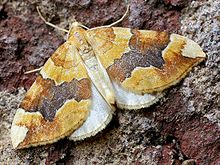Cidaria is a genus of moths in the family Geometridae. It was erected by Georg Friedrich Treitschke in 1825.
| Cidaria | |
|---|---|

| |
| Cidaria fulvata | |
| Scientific classification | |
| Domain: | Eukaryota |
| Kingdom: | Animalia |
| Phylum: | Arthropoda |
| Class: | Insecta |
| Order: | Lepidoptera |
| Family: | Geometridae |
| Tribe: | Cidariini |
| Genus: | Cidaria Treitschke, 1825 |
Description
editPalpi clothed with hair and reaching beyond the slight frontal tuft. Antennae of male typically minutely serrated and fasciculated. Hind tibia with two pairs of spurs. Forewings with vein 3 from near angle of cell and vein 5 from above middle of discocellulars. Vein 6 on or from just above upper angle. Vein 10 anastomosing (fusing) with vein 11 and then with veins 8 and 9 to form the double areole. Hindwings with vein 3 from close to angle of cell. The discocellulars oblique and vein 5 from or from above their middle. Veins 6 and 7 stalked.[1]
Species
edit- Cidaria antauges Prout, 1938
- Cidaria basharica Bang-Haas, 1927
- Cidaria deletaria Hampson, 1902
- Cidaria distinctata Staudinger, 1892
- Cidaria fulvata (Forster, 1771) – barred yellow
- Cidaria luteata Choi, 1997
- Cidaria nugata Felder, 1875
- Cidaria ochracearia Leech, 1897
- Cidaria ochreata Staudinger, 1895
References
edit- ^ Hampson, G. F. (1895). The Fauna of British India, Including Ceylon and Burma. Vol. Moths Volume III. Taylor and Francis – via Biodiversity Heritage Library.
- Savela, Markku. "Cidaria Treitschke, 1825". Lepidoptera and Some Other Life Forms. Retrieved July 25, 2018.
- Pitkin, Brian & Jenkins, Paul. "Search results Family: Geometridae". Butterflies and Moths of the World. Natural History Museum, London.